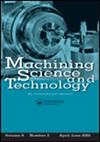SiCp/Al复合材料液氮深冷铣削性能的实验研究
IF 2.6
4区 工程技术
Q2 ENGINEERING, MANUFACTURING
引用次数: 5
摘要
碳化硅颗粒增强铝(SiCp/Al)复合材料是一种典型的难切削材料,已不能很好地应用于传统的机械加工。为了探索新的加工技术并验证其可行性,本文讨论了液氮(LN2)冷却液低温辅助铣削对SiCp/Al复合材料可加工性的影响。并将低温铣削的效果与传统干法铣削的效果进行了比较。结果表明,对20%SiCp/Al复合材料进行深冷铣削可以提高材料的表面硬度,与干法铣削相比,深冷铣削的切削力增加15%。此外,由于二次切削机制,在低温条件下,加工表面存在严重的刀具进给痕迹,导致表面粗糙度高,表面质量差。总体而言,与干式铣削技术相比,低温铣削的粗糙度Ra和粗糙度Rz分别高出46.73%和31.53%。铣刀的盘形角和加工环境对加工表面起着重要作用。低温铣削过程中切屑脆性增加,形成短弧切屑。研究表明,在低温条件下铣削SiCp/Al复合材料对材料的可加工性有负面影响。本文章由计算机程序翻译,如有差异,请以英文原文为准。
Experimental study on cryogenic milling performance of SiCp/Al composites with liquid nitrogen
Abstract Silicon carbide particulate-reinforced aluminum (SiCp/Al) composites is one of the typical difficult-to-cut materials, which are not suitable well for traditional machining any more. In order to explore new processing technology and verify its feasibility, this paper discussed the effects of cryogenic assisted milling with liquid nitrogen (LN2) coolant on the machinability of SiCp/Al composites. The effects of cryogenic milling were also compared with that of conventional dry milling. The results showed that cryogenic milling of 20% SiCp/Al composites would increase the surface hardness of the material, causing 15% higher amount of cutting force in cryogenic milling as compared to dry milling. In addition, there were serious tool feed marks on the machined surface under cryogenic condition because of the secondary cutting mechanism, which resulted in high surface roughness and poor surface quality. Overall, 46.73% higher roughness Ra and 31.53% roughness Rz were seen for cryogenic milling in comparison with dry milling technique respectively. The dish angle of milling tool and processing environment plays important roles in machined surface. Chip brittleness increased and short arc chips were formed in cryogenic milling. It was suggested that milling SiCp/Al composites under cryogenic condition had negative effects on the machinability of the material.
求助全文
通过发布文献求助,成功后即可免费获取论文全文。
去求助
来源期刊

Machining Science and Technology
工程技术-材料科学:综合
CiteScore
5.70
自引率
3.70%
发文量
18
审稿时长
6 months
期刊介绍:
Machining Science and Technology publishes original scientific and technical papers and review articles on topics related to traditional and nontraditional machining processes performed on all materials—metals and advanced alloys, polymers, ceramics, composites, and biomaterials.
Topics covered include:
-machining performance of all materials, including lightweight materials-
coated and special cutting tools: design and machining performance evaluation-
predictive models for machining performance and optimization, including machining dynamics-
measurement and analysis of machined surfaces-
sustainable machining: dry, near-dry, or Minimum Quantity Lubrication (MQL) and cryogenic machining processes
precision and micro/nano machining-
design and implementation of in-process sensors for monitoring and control of machining performance-
surface integrity in machining processes, including detection and characterization of machining damage-
new and advanced abrasive machining processes: design and performance analysis-
cutting fluids and special coolants/lubricants-
nontraditional and hybrid machining processes, including EDM, ECM, laser and plasma-assisted machining, waterjet and abrasive waterjet machining
 求助内容:
求助内容: 应助结果提醒方式:
应助结果提醒方式:


